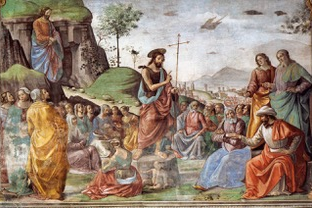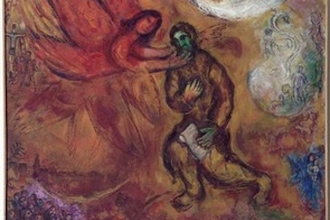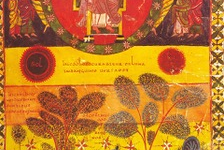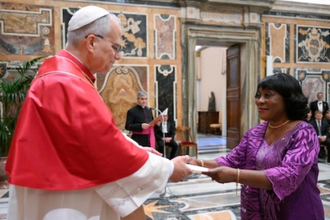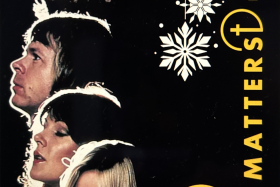Sunday Reflection with Canon Robin Gibbons - 28 April 2024
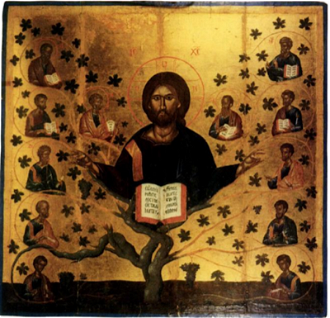
Christ the Vine, Angelos Akotantos, Cretan School
Fifth Sunday of Easter
The image of the vine
One of the advantages of coming from a mixed family background is the variety of experiences that we sample in the course of our lives. At the risk of putting a bit too much of my personal heritage before you, the French side of my family keeps me in touch with farming, particularly through their rearing of Montbéliarde cattle, whose milk is essential for the fabrication of Comte cheese and also the cultivation of vines, either on a small or large scale. So the theme of our Sunday's gospel from John 15 about viticulture, the metaphor of Jesus as the true vine, makes sense to me, as does that image linked to each of us as branches of that vine, cultivated by radical pruning in order to produce better fruit. I do it myself with the small number of vines I cultivate both here in the UK and in France, it may look drastic, but it is very necessary and does not harm the vine, instead stimulating vigorous and new growth:
'You are already pruned because of the word that I spoke to you. Remain in me, as I remain in you. Just as a branch cannot bear fruit on its own unless it remains on the vine, so neither cans you unless you remain in me. I am the vine, you are the branches. Whoever remains in me and I in him will bear much fruit, because without me you can do nothing'. (Jn 15: 3-5)
Pruning the branches
There is something both stark and yet comforting in John's picture of pruning the vine, cutting off dead wood, diseased branches, foliage and fruit, in order that it may flourish. The hard/stark image is that of the vine being examined, assessed and then cut to shape - an image which if we transfer it to ourselves might suggest some radical rethinking about our own lives and the direction in which we grow. But to off set that, the suggestion that pruning, leading change and growth, is done by the words of Jesus calling us to conversion of life in him, who lest we forget is the true vine. If we want to know what this pruning by the word involves, our second reading shares it with us:' And his commandment is this: we should believe in the name of his Son, Jesus Christ, and love one another just as he commanded us. Those who keep his commandments remain in him, and he in them, and the way we know that he remains in us is from the Spirit that he gave us. (I Jn 3:23,24)
In this manner, pruning is not so much a harsh stripping away of our negative attitudes, wrong decisions, selfish desires and sins, but a gentler more proactive movement to make a reality these words of I John: 'let us love not in word or speech but in deed and truth' (I Jn 3: 18) The Word, that is Christ dwelling in us, effects change and transformation in our lives.
Like Saul we too can become a Paul
If we want to find an example, our first reading picking up on the conversion of Saul to Paul and his new zeal amongst the community he persecuted should give us hope, suspicious of him, it was only when Barnabas took charge of the newly converted Paul and in that sense showed those who were fearful and angry that Saul had been pruned by his encounter with the Christ, that his words began to inspire deeds and bring forth justice shown in Pauls actions: 'When he arrived in Jerusalem* he tried to join the disciples, but they were all afraid of him, not believing that he was a disciple. Then Barnabas took charge of him and brought him to the apostles, and he reported to them how on the way he had seen the Lord and that he had spoken to him, and how in Damascus he had spoken out boldly in the name of Jesus'. (Acts 9: 26-27) Paul is an interesting example of that careful pruning by the living word, because it is Christ word that changed his life, and in that sense Christ can and will do this to us as well.
Remain in Christ's love.
We are part of the true vine, an image that has so many resonances for us, the wine, symbol of blood poured out for us in sacrifice, the grape pressed down at harvest time to produce a vintage wine, the gift of Christ's blood in the wine of the Eucharist. Branches needing tender care and nurturing (including pruning) to produce a hundredfold, there are so many nuances to focus on and all of them depend on that one promise and gift to us found in the word of Jesus shared today: 'If you remain in me and my words remain in you, ask for whatever you want and it will be done for you. By this is my Father glorified, that you bear much fruit and become my disciples. As the Father loves me, so I also love you. Remain in my love'. (Jn 15: 7-9) Let us then accept the gift and remain in Christ's love. Amen
Lectio divina
Didache
Chapter 9. The Eucharist. Now concerning the Eucharist, give thanks this way. First, concerning the cup:
We thank thee, our Father, for the holy vine of David Thy servant, which You madest known to us through Jesus Thy Servant; to Thee be the glory for ever..
And concerning the broken bread:
We thank Thee, our Father, for the life and knowledge which You madest known to us through Jesus Thy Servant; to Thee be the glory for ever. Even as this broken bread was scattered over the hills, and was gathered together and became one, so let Thy Church be gathered together from the ends of the earth into Thy kingdom; for Thine is the glory and the power through Jesus Christ for ever..
But let no one eat or drink of your Eucharist, unless they have been baptized into the name of the Lord; for concerning this also the Lord has said, "Give not that which is holy to the dogs."
I am the vine
Malcolm Guite Sonnet
So How might it feel to be part of the vine?
Not just to see the vineyard from afar
Or even pluck the clusters, press the wine,
But to be grafted in, to feel the stir
Of inward sap that rises from our root,
Himself deep planted in the ground of Love,
To feel a leaf unfold a tender shoot,
As tendrils curled unfurl, as branches give
A little to the swelling of the grape,
In gradual perfection, round and full,
To bear within oneself the joy and hope
Of God's good vintage, till it's ripe and whole.
What might it mean to bide and to abide
In such rich love as makes the poor heart glad?



